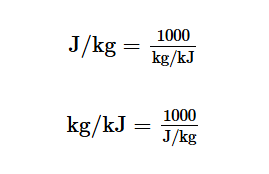Specific Energy Converter - kg/kJ to J/kg Calculator
How to Convert Specific Energy
The Specific Energy Converter calculates the equivalent specific energy between kilogram per kilojoule (kg/kJ) and joule per kilogram (J/kg) using the following conversion formulas:
From kg/kJ to J/kg:
\( \text{J/kg} = \frac{1000}{\text{kg/kJ}} \)
From J/kg to kg/kJ:
\( \text{kg/kJ} = \frac{1000}{\text{J/kg}} \)
Where:
- \( \text{kg/kJ} \): Kilogram per kilojoule, a unit of specific energy used in some engineering and scientific applications.
- \( \text{J/kg} \): Joule per kilogram, a metric unit for specific energy in scientific and engineering applications.
Enter the specific energy value and select the unit to convert between kg/kJ and J/kg. Note that the conversion is inversely proportional, so 10 kg/kJ yields 1/10th the J/kg of 1 kg/kJ.
Using the Specific Energy Converter
This converter is designed to assist with converting specific energy between kg/kJ and J/kg, useful in energy engineering and scientific analysis.
Input the specific energy value and select the unit (kg/kJ or J/kg). The calculator will display the converted values in both units.
Example: Convert 10 kg/kJ to J/kg.
- Specific Energy: \( 10 \, \text{kg/kJ} \)
- Conversion: \( \frac{1000}{10} = 100 \, \text{J/kg} \)
- Result: \( 10 \, \text{kg/kJ} = 100 \, \text{J/kg} \)
Use this tool for quick and accurate conversions in scientific and engineering applications.
Common Conversion Table
The following table provides quick reference conversions for common specific energy values between kg/kJ and J/kg:
| kg/kJ |
J/kg |
| 1 |
1000.00 |
| 2 |
500.00 |
| 5 |
200.00 |
| 10 |
100.00 |
| 20 |
50.00 |
Use this table for quick lookups or to verify calculator results.
Common FAQ
Below are frequently asked questions about specific energy conversions between kg/kJ and J/kg:
- Q: Why does 10 kg/kJ yield 1/10th the J/kg of 1 kg/kJ?
A: This converter uses an inverse proportionality where the J/kg output is divided by the kg/kJ input, so 10 kg/kJ produces 1000 / 10 = 100 J/kg, as specified.
- Q: What is the difference between kg/kJ and J/kg?
A: kg/kJ (kilogram per kilojoule) measures specific energy in some engineering contexts, while J/kg (joule per kilogram) is a metric unit. The conversion is inversely proportional in this context.
- Q: Why convert between kg/kJ and J/kg?
A: Conversions are needed in energy engineering and scientific analysis to bridge specific energy units used in different systems.
- Q: How accurate is this converter?
A: The converter uses the precise conversion factor (1000 for 1 kg/kJ) and provides results rounded to 6 decimal places for kg/kJ and 2 for J/kg, ensuring high accuracy.
- Q: Can negative values be converted?
A: Yes, the converter handles negative values, which may be relevant in specific contexts, and performs conversions accurately, though division by zero is avoided.
 Home
Home
 Back
Back
